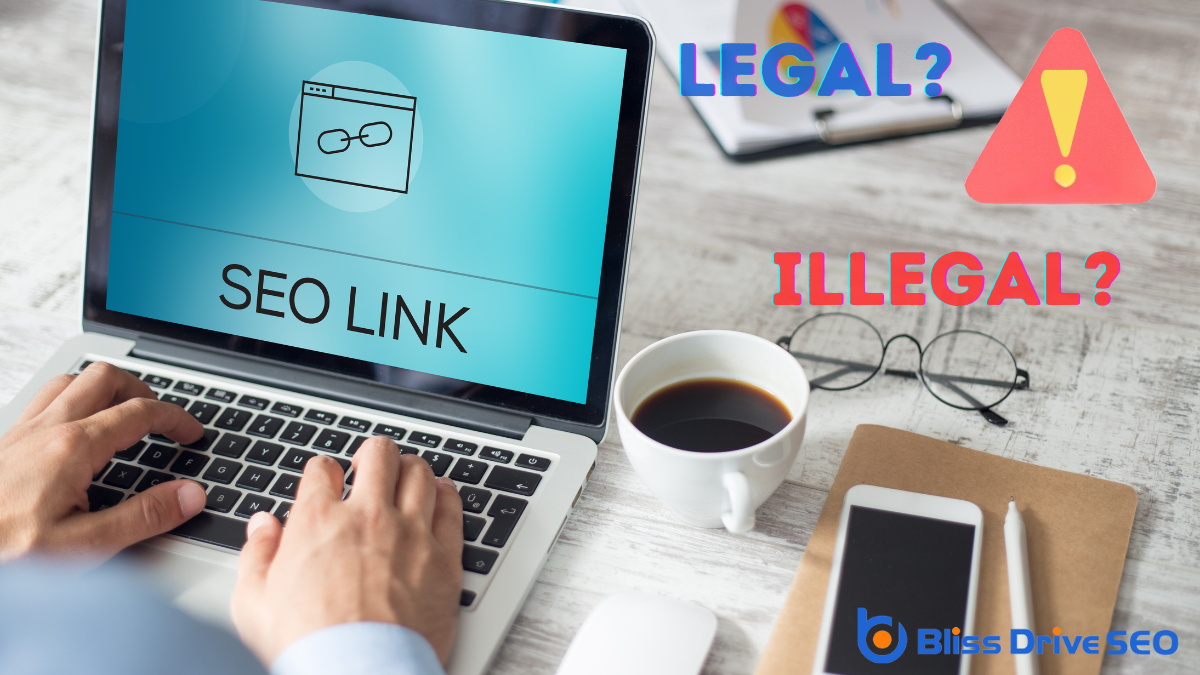Learn More About Us

You've probably heard the buzz around link buildingThe process of acquiring backlinks from other websites. and wondered if it's crossing any legal lines. It's not exactly a clear-cut issue. Sure, link building itself isn't illegal, but there are ethical and legal nuances you can't overlook. Distinguishing between legitimate SEO practices and shady tactics is essential to staying on the right side of the law. Are you aware of how copyright laws, privacy regulations, and Google's guidelines play into this? Maneuvering these waters is vital for your online strategy, but do you know where to start?
Link building is a crucial aspect of search engine optimization (SEO) and is often misunderstood. You might think it's just about acquiring as many links as possible to your site, but there's more to it. Link building involves obtaining hyperlinks from other websites that point to your own, which search engines perceive as a vote of confidence. When done correctly, it can greatly enhance your site's visibility and credibility.
To grasp the concept of link building, you need to understand that search engines utilize links to crawl the web. They follow links between the individual pages of your website and the links connecting entire websites. When a reputable site links to yours, it signals to search engines that your content is valuable and trustworthy. Consequently, quality matters more than quantity.
You should concentrate on building relationships with reputable sites in your nicheA specific segment of the market targeted by affiliates to promote products or services.. This isn't about exchanging links or purchasing them, which can result in penalties. Instead, it's about creating valuable content that others naturally want to link to. By doing so, you enhance your site's authority and increase your chances of ranking higher in search engine results, ultimately driving more organic trafficVisitors who come to a website through unpaid search engine results..

As you navigate the world of SEO, understanding the legal aspects is just as important as grasping the technical side. You might wonder whether certain SEO practices, like link building, are legal. Rest assured, link building itself isn't illegal. However, you need to be mindful of how you conduct it to avoid crossing legal boundaries.
Firstly, pay attention to copyright laws. When creating content to gain backlinksLinks from other websites pointing to your website, crucial for SEO., make sure you're not infringing on someone else's intellectual property. Use original content or secure permissions if you're using others' work. Plagiarism can lead to legal problems and damage your reputation.
Secondly, consider contracts and agreements. If you're outsourcing link building or collaborating with partners, have clear, written agreements. This prevents misunderstandings and potential legal disputes.
Additionally, be cautious with deceptive practices. Avoid using hidden links or cloaking techniques that mislead users or search engines. These actions can result in penalties from search engines and potential legal consequences.
Lastly, respect privacy laws. When collecting data for SEO purposes, comply with regulations like GDPR. Being transparent about how you handle data not only keeps you compliant but also builds trust with your audience.
When engaging in link building, one must take into account the ethical implications of your strategies. It's vital to make sure that your methods honor both the integrity of the web and the users who navigate it. Ethical link-building involves earning links naturally rather than coercing or manipulating them through questionable tactics. By focusing on providing value, you're more likely to foster genuine connections with credible sites.
You might wonder, "What exactly makes a link-building practice ethical?" Consider this: does your approach prioritize quality over quantity? Generating high-quality, relevant content that organically attracts links is a key component. Avoid practices like purchasing links or participating in link farms, as these can undermine trust and lead to negative repercussions.
Additionally, transparency is pivotal. When forming partnerships or collaborations with other websites, being upfront about intentions and maintaining honest communication can go a long way in building trust. It's not just about gaining links but nurturing relationships that benefit both parties.
Understanding Google's guidelines is crucial when you're engaging in link building. You want to guarantee that your efforts align with Google's rules to maintain your site's credibility and search ranking. Google's guidelines emphasize the importance of natural link building, which means earning links organically rather than buying or exchanging them in manipulative ways.
When you're creating content, focus on quality and relevance, as these attract natural links. Google values links that provide genuine value to users, so your aim should be to build relationships with reputable websites and create shareable content.
You shouldn't engage in practices like using automated programs to create links or participating in link schemes, as these are explicitly against Google's guidelines.
Google's Webmaster GuidelinesRules and best practices provided by search engines for webmasters to follow. also advise against excessive link exchanges or the creation of low-quality directory links. Such practices can harm your site's reputation and result in penalties. Instead, focus on earning links through authentic mentions and recommendations from other credible sites.

You've learned about Google's guidelines, but let's look at what happens when those rules are ignored. Engaging in poor link-building practices can lead to significant risks for your website. One of the most prominent dangers is the potential for penalties from search engines. Google uses sophisticated algorithms to detect unnatural link patterns. If they find you're manipulating links to improve rankingsThe position at which a website appears in the SERP., your site could face severe penalties, including being demoted in search results or even removed entirely.
Another risk involves wasting resources. When you focus on acquiring low-quality links, you're investing time and money into strategies that don't deliver long-term benefits. Instead of boosting your site's credibility, these links can damage your site's reputation and trustworthiness.
Furthermore, poor practices can lead to negative user experiences. When users click on irrelevant or spammy links, they're likely to leave your site quickly, increasing your bounce rateThe percentage of visitors who leave a website after viewing only one page.. This behavior signals to search engines that your content mightn't be valuable.
Ignoring best practices for link building can lead to a cycle of penalties, wasted resources, and a damaged reputation. Avoid these pitfalls by understanding the potential risks and focusing on quality over quantity.
One effective way to ensure compliance with link-building guidelines is by focusing on creating high-quality, relevant content that naturally attracts backlinks. When you generate content that's informative, engaging, and valuable, other sites will naturally want to link to it, reducing the need for manipulative strategies. This approach not only aligns with search engine guidelines but also enhances your site's authority and credibility.
You should also prioritize building relationships within your industry. Networking with bloggers, influencersIndividuals with the power to affect the purchasing decisions of others due to their authority, know..., and industry leaders can open doors for guest posting opportunities and collaborations that lead to genuine backlinks. Always aim for transparency and authenticity in these interactions, as deception can damage your reputation and lead to penalties.
It's important to continually audit your existing backlinks. Use tools to monitor your link profile and identify any potentially harmful or low-quality links. Regular audits help you maintain a clean link profile, which is essential for compliance and ideal search engine performance.
In your link building efforts, it's important you focus on ethical and legal practices. Although link-building isn't illegal, you should always respect copyright laws, establish clear agreements, and avoid deceptive tactics. Aligning with Google's guidelines guarantees your strategies are both effective and compliant. Prioritize transparency and respect privacy laws like GDPR. By doing so, you'll enhance your online presence without risking any legal issues or damaging your credibility. Always opt for best practices to succeed.
